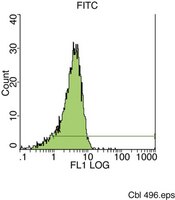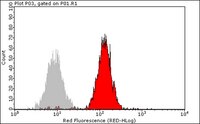The Fat1 cadherin is overexpressed and an independent prognostic factor for survival in paired diagnosis-relapse samples of precursor B-cell acute lymphoblastic leukemia.
C E de Bock,A Ardjmand,T J Molloy,S M Bone,D Johnstone,D M Campbell,K L Shipman,T M Yeadon,J Holst,M D Spanevello,G Nelmes,D R Catchpoole,L F Lincz,A W Boyd,G F Burns,R F Thorne
Leukemia : official journal of the Leukemia Society of America, Leukemia Research Fund, U.K
26
2012
Show Abstract
Improved survival of patients with acute lymphoblastic leukemia (ALL) has emerged from identifying new prognostic markers; however, 20% of children still suffer recurrence. Previously, the altered expression of Fat1 cadherin has been implicated in a number of solid tumors. In this report, in vitro analysis shows that Fat1 protein is expressed by a range of leukemia cell lines, but not by normal peripheral blood (PB) and bone marrow (BM) cells from healthy donors. In silico analysis of expression of array data from clinical leukemias found significant levels of Fat1 transcript in 11% of acute myeloid leukemia, 29% and 63% of ALL of B and T lineages, respectively, and little or no transcript present in normal PB or BM. Furthermore, in two independent studies of matched diagnosis-relapse of precursor B-cell (preB) ALL pediatric samples (n=32 and n=27), the level of Fat1 mRNA expression was prognostic at the time of diagnosis. High Fat1 mRNA expression was predictive of shorter relapse-free and overall survival, independent of other traditional prognostic markers, including white blood cell count, sex and age. The data presented demonstrate that Fat1 expression in preB-ALL has a role in the emergence of relapse and could provide a suitable therapeutic target in high-risk preB-ALL. | 22116550
 |
Increased microglia/macrophage gene expression in a subset of adult and pediatric astrocytomas.
Engler, JR; Robinson, AE; Smirnov, I; Hodgson, JG; Berger, MS; Gupta, N; James, CD; Molinaro, A; Phillips, JJ
PloS one
7
e43339
2012
Show Abstract
Glioblastoma (GBM) is a highly malignant brain tumor with a dismal prognosis. Gene expression profiling of GBM has revealed clinically relevant tumor subtypes, and this provides exciting opportunities to better understand disease pathogenesis. Results from an increasing number of studies demonstrate a role for the immune response in cancer progression, yet it is unclear how the immune response differs across tumor subtypes and how it affects outcome. Utilizing gene expression data from The Cancer Genome Atlas Project and the Gene Expression Omnibus database, we demonstrate an enrichment of immune response-related gene expression in the mesenchymal subtype of adult GBM (n = 173) and pediatric high-grade gliomas (n = 53). In an independent cohort of pediatric astrocytomas (n = 24) from UCSF, we stratified tumors into subtypes and confirmed these findings. Using novel immune cell-specific gene signatures we demonstrate selective enrichment of microglia/macrophage-related genes in adult and pediatric GBM tumors of the mesenchymal subtype. Furthermore, immunostaining of adult GBM tumors showed significantly higher cell numbers of microglia/macrophages in mesenchymal versus non-mesenchymal tumors (p = 0.04). Interestingly, adult GBM tumors with the shortest survival had significant enrichment of microglia/macrophage-related genes but this was not true for pediatric GBMs. Consistent with an association with poor outcome, immune response-related genes were highly represented in an adult poor prognosis gene signature, with the expression of genes related to macrophage recruitment and activation being most strongly associated with survival (pless than 0.05) using CoxBoost multivariate modeling. Using a microglia/macrophage high gene signature derived from quantification of tumor-infiltrating cells in adult GBM, we identified enrichment of genes characteristic of CD4 T cells, granulocytes, and microglia/macrophages (n = 573). These studies support a role for the immune response, particularly the microglia/macrophage response, in the biology of an important subset of GBM. Identification of this subset may be important for future therapeutic stratification. | 22937035
 |
The ß1-integrin-dependent function of RECK in physiologic and tumor angiogenesis.
Takao Miki,Awad Shamma,Shunsuke Kitajima,Yujiro Takegami,Makoto Noda,Yasuaki Nakashima,Ken-Ichiro Watanabe,Chiaki Takahashi
Molecular cancer research : MCR
8
2010
Show Abstract
Vascular endothelial cells produce considerable amounts of matrix metalloproteinases (MMP), including MMP-2, MMP-9, and membrane type 1 (MT1)-MMP. However, little is known about the regulatory mechanisms of these protease activities exhibited during vascular development. A glycosylphosphatidylinositol-anchored glycoprotein, reversion-inducing cysteine-rich protein with Kazal motifs (RECK), has been shown to attenuate MMP-2 maturation by directly interacting with MT1-MMP. Here, we show that an angiogenic factor angiopoietin-1 induces RECK expression in human umbilical vein endothelial cells (HUVEC), and RECK depletion in these cells results in defective vascular tube formation and cellular senescence. We further observed that RECK depletion downregulates beta1-integrin activation, which was associated with decreased autophosphorylation of focal adhesion kinase and increased expression of a cyclin-dependent kinase inhibitor p21(CIP1). In agreement, significant downregulation of beta1-integrin activity was observed in vascular endothelial cells in Reck-/- mouse embryos. In HUVECs, specific inhibition of MMP-2 significantly antagonized the effect of RECK depletion on beta1-integrin signaling, cell proliferation, and tube elongation. Furthermore, we observed that hypervascular tumor-derived cell lines can induce high RECK expression in convoluted vascular endothelial cells, and this in turn supports tumor growth. Targeting RECK specifically in tumor-associated vascular endothelial cells resulted in tumor regression. Therefore, we propose that RECK in tumor vascular endothelial cells can be an interesting target of cancer treatment via abortion of tumor angiogenesis. | 20407016
 |
Expression of the CD34 gene in vascular endothelial cells.
Fina, L, et al.
Blood, 75: 2417-26 (1990)
1990
Show Abstract
All seven of a set of CD34 monoclonal antibodies that recognize epitopes on an approximately 110 Kd glycoprotein on human hemopoietic progenitor cells also bind to vascular endothelium. Capillaries of most tissues are CD34 positive, as are umbilical artery and, to a lesser extent, vein, but the endothelium of most large vessels and the endothelium of placental sinuses are not. Angioblastoma cells and parafollicular mesenchymal cells in fetal skin are also CD34 positive, as are some stromal elements. An approximately 110 Kd protein can be identified by Western blot analysis with CD34 antibodies in detergent extracts of freshly isolated umbilical vessel endothelial cells, and CD34 mRNA is present in cultured umbilical vein cells as well as other tissues rich in vascular endothelium (breast, placenta). These data indicate that the binding of CD34 antibodies to vascular endothelium is to the CD34 gene product, and not to crossreactive epitopes. Despite the presence of CD34 mRNA in cultured, proliferating endothelial cells, the latter do not bind CD34 antibodies. In addition, CD34 antigen cannot be upregulated by growth factors. We conclude that under these conditions, CD34 protein is downregulated or processed into another form that is unreactive with CD34 antibodies. Electron microscopy of umbilical artery, breast, and kidney capillary vessels reveals that in all three sites, CD34 molecules are concentrated on membrane processes, many of which interdigitate between adjacent endothelial cells. However, well-established endothelial cell contacts with tight junctions are CD34 negative. CD34 may function as an adhesion molecule on both endothelial cells and hematopoietic progenitors. | 1693532
 |













